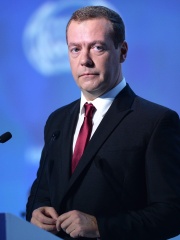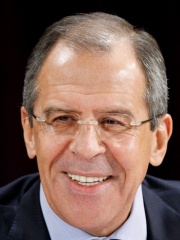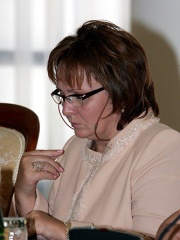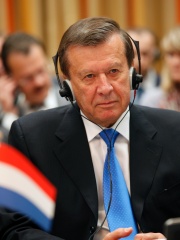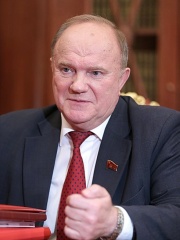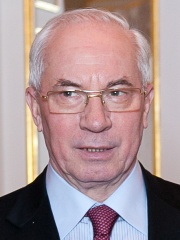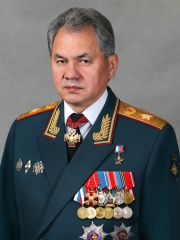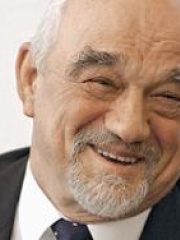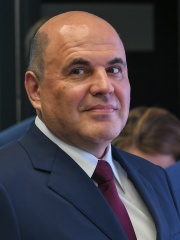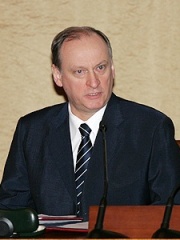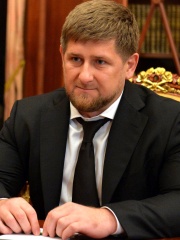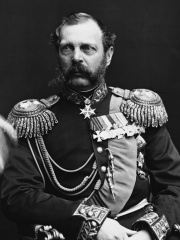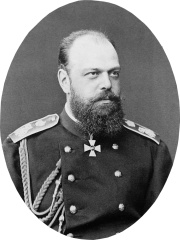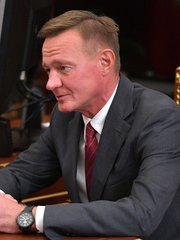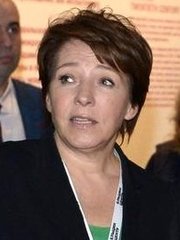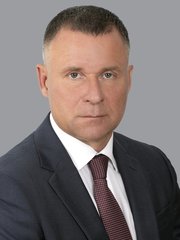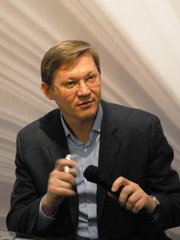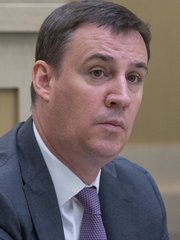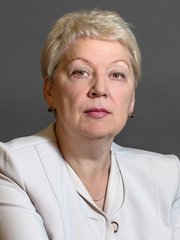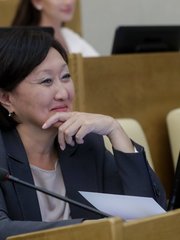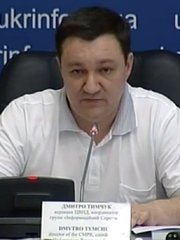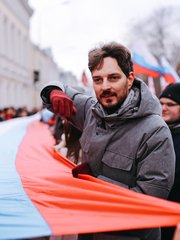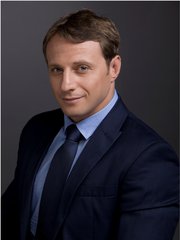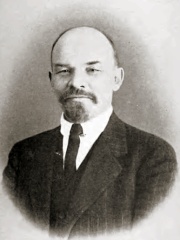
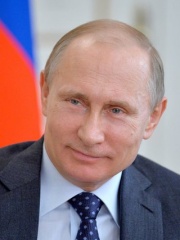
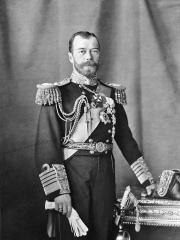

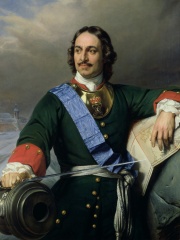
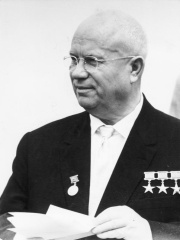
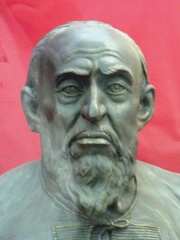
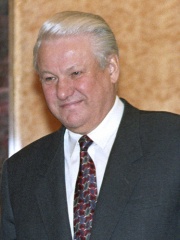
The Most Famous
POLITICIANS from Russia
This page contains a list of the greatest Russian Politicians. The pantheon dataset contains 19,576 Politicians, 581 of which were born in Russia. This makes Russia the birth place of the 6th most number of Politicians behind Italy, and United Kingdom.
Top 10
The following people are considered by Pantheon to be the top 10 most legendary Russian Politicians of all time. This list of famous Russian Politicians is sorted by HPI (Historical Popularity Index), a metric that aggregates information on a biography's online popularity. Visit the rankings page to view the entire list of Russian Politicians.

1. Vladimir Lenin (1870 - 1924)
With an HPI of 91.51, Vladimir Lenin is the most famous Russian Politician. His biography has been translated into 209 different languages on wikipedia.
Vladimir Ilyich Ulyanov (22 April [O.S. 10 April] 1870 – 21 January 1924), better known as Vladimir Lenin, was a Russian revolutionary, politician and political theorist. He was the first head of government of Soviet Russia from 1917 until his death in 1924 and of the Soviet Union from 1922 until his death. As the Bolsheviks' founder, Lenin led the October Revolution, which established the world's first communist state and short-lived soviet democracy. His government won the Russian Civil War and created a one-party state under the Communist Party. Ideologically a Marxist, his developments to the ideology are called Leninism. Lenin embraced revolutionary socialist politics after his brother was executed in 1887 for plotting to assassinate Tsar Alexander III. He was expelled from Kazan Imperial University for participating in student protests, and earned a law degree before moving to Saint Petersburg in 1893 and becoming a prominent Marxist activist. In 1897, Lenin was exiled to Siberia for three years, after which he moved to Western Europe and became a leading figure in the Russian Social Democratic Labour Party. In 1903, the party split between Lenin's Bolshevik faction and the Mensheviks, with he advocating for a vanguard party to lead the proletariat in establishing socialism. Lenin briefly returned to Russia during the Revolution of 1905. During the First World War, he campaigned for its transformation into a Europe-wide proletarian revolution. After the February Revolution of 1917 ousted Tsar Nicholas II, Lenin returned to Russia and played a leading role in the October Revolution. Lenin's government abolished private ownership of land, nationalised major industry and banks, withdrew from the war by signing the Treaty of Brest-Litovsk and promoted world revolution through the Communist International. The Bolsheviks initially shared power with the Left Socialist Revolutionaries, but during the civil war, they centralised power in the Communist Party and suppressed opposition in the Red Terror, in which tens of thousands were killed or imprisoned. Responding to famine and popular uprisings, Lenin reversed his policy of war communism in 1921 and stabilised the economy with the New Economic Policy. The Red Army defeated numerous anti-Bolshevik and separatist armies in the civil war, after which some of the non-Russian nations which had broken away from the empire were reunited in the Soviet Union in 1922; others, notably Poland, gained independence. Lenin suffered three debilitating strokes in 1922 and 1923 before his death in 1924, beginning a power struggle which ended in Joseph Stalin's rise to power. Lenin was the posthumous subject of a pervasive personality cult within the Soviet Union until its dissolution in 1991. Under Stalin, he became an ideological figurehead of Marxism–Leninism and a prominent influence over the international communist movement. A controversial and highly divisive figure, Lenin is praised by his supporters for establishing a revolutionary government which took steps towards socialism, anti-imperialism, social reforms and worker's control, while his critics condemn him for establishing a dictatorship which oversaw mass killings and political repression. He is widely considered one of the most significant figures of the 20th century.

2. Vladimir Putin (b. 1952)
With an HPI of 90.03, Vladimir Putin is the 2nd most famous Russian Politician. His biography has been translated into 229 different languages.
Vladimir Vladimirovich Putin (born 7 October 1952) is a Russian politician and former intelligence officer who has served as President of Russia since 2012, having previously served from 2000 to 2008. Putin also served as Prime Minister of Russia from 1999 to 2000 and again from 2008 to 2012. He has been described as the de facto leader of Russia since 2000. Born in Leningrad (now Saint Petersburg), Putin worked as a KGB foreign intelligence officer for 16 years, rising to the rank of lieutenant colonel. He resigned in 1991 to begin a political career in Saint Petersburg. In 1996, Putin moved to Moscow to join the administration of President Boris Yeltsin. He briefly served as the director of the Federal Security Service (FSB) and then as secretary of the Security Council of Russia before being appointed prime minister in August 1999. Following Yeltsin's resignation, Putin became acting president and, less than four months later in May 2000, was elected to his first term as president. He was reelected in 2004. Due to constitutional limitations on two consecutive presidential terms, Putin served as prime minister again from 2008 to 2012 under Dmitry Medvedev. He returned to the presidency in 2012, following an election marked by allegations of fraud and protests, and was reelected in 2018. During Putin's initial presidential tenure, the Russian economy grew on average by seven percent per year as a result of economic reforms and a fivefold increase in the price of oil and gas. Additionally, Putin led Russia in a conflict against Chechen separatists, re-establishing federal control over the region. While serving as prime minister under Medvedev, he oversaw the Russo-Georgian War, alongside enacting military and police reforms. In his third presidential term, Russia occupied and annexed Crimea as well as supported a war in eastern Ukraine through several military incursions, resulting in international sanctions, which, together with a drop in oil prices on the international markets, led to the financial crisis in Russia. Additionally, he ordered a military intervention in Syria to support his ally, president of Syria Bashar al-Assad, during the Syrian civil war. In April 2021, after a referendum, he signed constitutional amendments into law that included one allowing him to run for reelection twice more, potentially extending his presidency to 2036. In February 2022, during his fourth presidential term, Putin launched a full-scale invasion of Ukraine, which prompted international condemnation and led to expanded sanctions. In September 2022, he announced a partial mobilization and forcibly annexed four Ukrainian oblasts into Russia. In March 2023, the International Criminal Court issued an arrest warrant for Putin for war crimes related to his alleged criminal responsibility for illegal child abductions during the war. In March 2024, he was reelected to another term. Under Putin's rule, the Russian political system has been transformed into an authoritarian dictatorship with a personality cult. His rule has been marked by endemic corruption and widespread human rights violations, including the imprisonment and suppression of political opponents, intimidation and censorship of independent media in Russia, and a lack of free and fair elections. Russia has consistently received very low scores on Transparency International's Corruption Perceptions Index, The Economist Democracy Index, Freedom House's Freedom in the World index, and the Reporters Without Borders' World Press Freedom Index.

3. Nicholas II of Russia (1868 - 1918)
With an HPI of 87.96, Nicholas II of Russia is the 3rd most famous Russian Politician. His biography has been translated into 110 different languages.
Nicholas II (Nikolai Alexandrovich Romanov; 18 May [O.S. 6 May] 1868 – 17 July 1918) was Emperor of Russia, King of Congress Poland, and Grand Duke of Finland from 1 November 1894 until his abdication in 1917. His reign of over 22 years marked the final chapter of the Romanov dynasty, which had ruled Russia for more than three centuries. Nicholas married Alix of Hesse (later Alexandra Feodorovna), and they had five children: four daughters, Olga, Tatiana, Maria, and Anastasia, and a son, Alexei, the Tsesarevich. Born in Tsarskoye Selo, Nicholas was the eldest son of Emperor Alexander III and Empress Maria Feodorovna. He was educated privately and trained for military service, but was widely considered ill-prepared for the demands of ruling a vast empire. As a constitutional monarch, he resisted political reform and retained autocratic control, despite the establishment of the Duma. His reign saw significant industrial growth and diplomatic engagement, including the Hague Conventions and the Anglo-Russian Convention of 1907, but was also marked by domestic unrest, military defeats, and widespread criticism. Nicholas faced mounting pressure following Russia's defeat in the Russo-Japanese War and the turmoil of the 1905 Revolution. His popularity declined further during World War I, as military losses and economic hardship eroded public confidence. In March 1917, the February Revolution forced his abdication, ending the Romanov dynasty's 304-year rule. He and his family were imprisoned by the Provisional Government and later transferred to Bolshevik custody. On 17 July 1918, they were executed in Yekaterinburg. Vilified by Soviet historians as a symbol of repression and incompetence, Nicholas has been reassessed more sympathetically in post-Soviet Russia. He and his family were canonised as passion bearers by the Russian Orthodox Church in 2000, following the discovery and reburial of their remains in 1998.

4. Mikhail Gorbachev (1931 - 2022)
With an HPI of 87.63, Mikhail Gorbachev is the 4th most famous Russian Politician. His biography has been translated into 156 different languages.
Mikhail Sergeyevich Gorbachev (2 March 1931 – 30 August 2022) was a Soviet and Russian politician who was the last leader of the Soviet Union from 1985 until the country's dissolution in 1991. He served as General Secretary of the Communist Party from 1985, and additionally as head of state from 1988. Ideologically, he initially adhered to Marxism–Leninism, but moved towards social democracy by the early 1990s. Born in Privolnoye, North Caucasus Krai, into a peasant family of Russian and Ukrainian heritage, Gorbachev grew up under the rule of Joseph Stalin. In his youth, Gorbachev operated combine harvesters on a collective farm, before joining the Communist Party, which then governed the Soviet Union as a one-party state. Studying at Moscow State University, he married fellow student Raisa Titarenko in 1953 and received his law degree in 1955. Moving to Stavropol, he worked for the Komsomol youth organization and, after Stalin's death, became a keen proponent of the de-Stalinization reforms of Soviet leader Nikita Khrushchev. Gorbachev was appointed the first party secretary of the Stavropol Regional Committee in 1970, overseeing the construction of the Great Stavropol Canal. In 1978, Gorbachev returned to Moscow to become a secretary of the party's Central Committee. He joined the governing Politburo (25th term) as a non-voting member the following year and as a voting member in 1980. Three years after the death of Soviet leader Leonid Brezhnev, following the brief tenures of Yuri Andropov and Konstantin Chernenko in 1985, the Politburo elected Gorbachev as general secretary. Although committed to preserving the Soviet state and its Marxist–Leninist principles, Gorbachev believed significant reform was necessary for its survival. He withdrew troops from the Soviet–Afghan War, and embarked on summits with United States president Ronald Reagan to limit nuclear weapons and end the Cold War. Domestically, Gorbachev's policy of glasnost ("openness") and demokratizatsiya ("democratization") allowed for enhanced freedom of speech and the press, while his perestroika ("restructuring") sought to decentralize economic decision-making to improve its efficiency. Ultimately, his democratization measures and formation of the elected Congress of People's Deputies undermined the one-party state. When various Warsaw Pact countries abandoned Marxist–Leninist governance in 1989, he declined to intervene militarily. Growing nationalist sentiment within constituent republics threatened to break up the Soviet Union, leading hardliners within the party to launch an unsuccessful coup against him in August 1991. In the coup's wake, the Soviet Union dissolved against Gorbachev's wishes. After resigning from the presidency, he launched the Gorbachev Foundation, became a vocal critic of Russian presidents Boris Yeltsin and Vladimir Putin, and campaigned for Russia's social-democratic movement. Considered one of the most significant figures of the second half of the 20th century, Gorbachev remains controversial. The recipient of a wide range of awards, including the Nobel Peace Prize, he was praised for his role in ending the Cold War, introducing new political and economic freedoms in the Soviet Union, and tolerating both the fall of Marxist–Leninist administrations in eastern and central Europe and the German reunification. Critics see him as weakening Russia's global influence and precipitating an economic collapse in the country.
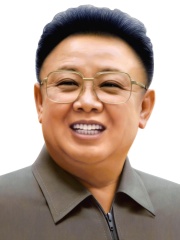
5. Kim Jong-il (1941 - 2011)
With an HPI of 87.59, Kim Jong-il is the 5th most famous Russian Politician. His biography has been translated into 117 different languages.
Kim Jong Il (born Yuri Kim; 16 February 1941 or 1942 – 17 December 2011) was a North Korean politician and dictator who was the second supreme leader of North Korea from the death of his father Kim Il Sung in 1994 until his own death in 2011. Posthumously, Kim Jong Il was declared Eternal General Secretary of the Workers' Party of Korea (WPK). In the early 1980s, Kim had become the heir apparent for the leadership of North Korea, thus being established the Kim family, and he assumed important posts in party and army organizations. Kim succeeded his father and founder of North Korea, Kim Il Sung, following his death in 1994. Kim was the General Secretary of the WPK, WPK Presidium, WPK Central Military Commission, Chairman of the National Defence Commission (NDC) of North Korea and the Supreme Commander of the Korean People's Army (KPA), the fourth-largest standing army in the world. Like his father, Kim ruled North Korea as a repressive and totalitarian dictatorship. Kim assumed leadership during a period of catastrophic economic crisis amidst the dissolution of the Soviet Union, on which it was heavily dependent for trade in food and other supplies, which brought a famine. While the famine had ended by the late 1990s, food scarcity continued to be a problem throughout his tenure. Kim strengthened the role of the military by his Songun ("military-first") policies, making the army the central organizer of civil society. Kim's rule also saw tentative economic reforms, including the opening of the Kaesong Industrial Park in 2003. Under his leadership, North Korea conducted its first nuclear test in October 2006, becoming the world's ninth nuclear-armed state. In April 2009, North Korea's constitution was amended to refer to him and his successors as the "supreme leader of the DPRK". The most common colloquial title given to Kim during his lifetime was "Dear Leader" to distinguish him from his father Kim Il Sung, the "Great Leader". Following Kim's failure to appear at important public events in 2008, foreign observers assumed that Kim had either fallen seriously ill or died. On 19 December 2011, the North Korean government announced that he had died two days earlier, whereupon his third son, Kim Jong Un, was promoted to a senior position in the ruling WPK and succeeded him. After his death, alongside "Eternal General Secretary" of the WPK, Kim Jong Il was declared "Eternal Chairman" of the now defunct National Defence Commission, in keeping with the tradition of establishing eternal posts for the dead members of the Kim dynasty. North Korean media also began referring to Kim as "the General" (장군 Changgun), similar to his father's posthumous designation as "the [eternal] President".

6. Peter the Great (1672 - 1725)
With an HPI of 86.89, Peter the Great is the 6th most famous Russian Politician. His biography has been translated into 151 different languages.
Peter I (Russian: Пётр I Алексеевич, romanized: Pyotr I Alekseyevich, IPA: [ˈpʲɵtr ɐlʲɪkˈsʲejɪvʲɪtɕ]; better known as Peter the Great; 9 June [O.S. 30 May] 1672 – 8 February [O.S. 28 January] 1725) was the Tsar of all Russia from 1682 and the first Emperor of Russia from 1721 until his death in 1725. He reigned jointly with his half-brother Ivan V until 1696. Peter, as an autocrat, organized a well ordered police state. Much of Peter's reign was consumed by lengthy wars against the Ottoman and Swedish empires. His Azov campaigns were followed by the foundation of the Russian Navy; after his victory in the Great Northern War, Russia annexed a significant portion of the eastern Baltic coastline and was officially renamed from a tsardom to an empire. Peter led a cultural revolution that replaced some of the traditionalist and medieval social and political systems with ones that were modern, scientific, Westernized, and based on the radical Enlightenment. In December 1699, he introduced the Julian calendar, and in 1703, he introduced the first Russian newspaper, Sankt-Peterburgskie Vedomosti, and ordered the civil script, a reform of Russian orthography largely designed by himself. On the shores of the Neva River, he founded Saint Petersburg, a city famously dubbed by Francesco Algarotti as the "window to the West". In 1712, Peter relocated the capital from Moscow to St. Petersburg, a status it retained until 1918. Peter had a great interest in plants, animals and minerals, in malformed creatures or exceptions to the law of nature for his cabinet of curiosities. He encouraged research of deformities, all along trying to debunk the superstitious fear of monsters. He promoted industrialization in the Russian Empire and higher education. The Russian Academy of Sciences and the Saint Petersburg State University were founded in 1724, and invited Christian Wolff and Willem 's Gravesande. Peter is primarily credited with the modernization of the country, quickly transforming it into a major European power. His administrative reforms, creating a Governing Senate in 1711, the Collegium in 1717 and the Table of Ranks in 1722 had a lasting impact on Russia, and many institutions of the Russian government trace their origins to his reign.

7. Nikita Khrushchev (1894 - 1971)
With an HPI of 85.59, Nikita Khrushchev is the 7th most famous Russian Politician. His biography has been translated into 126 different languages.
Nikita Sergeyevich Khrushchev (15 April [O.S. 3 April] 1894 – 11 September 1971) was the First Secretary of the Communist Party of the Soviet Union from 1953 to 1964 and the Chairman of the Council of Ministers from 1958 to 1964. As leader of the Soviet Union, he stunned the world by denouncing his predecessor Joseph Stalin, embarking on a campaign of de-Stalinization, and presiding over the Cuban Missile Crisis in 1962. Nikita Khrushchev was born in a village in western Russia on 15 April 1894. He was employed as a metal worker during his youth and was a political commissar in the Russian Civil War. Under the sponsorship of Lazar Kaganovich, Khrushchev rose through the ranks of the Soviet hierarchy. During Stalin's rule, he actively supported the Great Purge and approved thousands of arrests. In 1938, Stalin sent him to govern the Ukrainian SSR, and he continued the purges there. During the Great Patriotic War, Khrushchev was again a commissar, serving as an intermediary between Stalin and his generals. He was also present at the defense of Stalingrad, a fact in which he took great pride. After the war, Khrushchev returned to Ukraine before being recalled to Moscow as one of Stalin's close advisers. On 5 March 1953, the death of Stalin triggered a power struggle in which Khrushchev ultimately emerged victorious upon consolidating his authority as First Secretary of the party's Central Committee. On 25 February 1956, at the 20th Party Congress, he delivered the "Secret Speech", which denounced Stalin's purges and ushered in a less repressive era in the Soviet Union. His domestic policies, aimed at bettering the lives of ordinary citizens, were often ineffective, especially in agriculture. Hoping eventually to rely on missiles for national defense, Khrushchev ordered major cuts in conventional forces. Despite such cuts, Khrushchev's time in office saw the tensest years of the Cold War, culminating in the 1962 Cuban Missile Crisis. As leader of the Soviet Union, Nikita Khrushchev enjoyed considerable popularity during the late 1950s due to the successful launching of Sputnik in 1957 as well as favorable outcomes in the 1956 Suez Crisis, 1957 Syrian Crisis, and 1960 U-2 incident. However, by the early 1960s, Khrushchev's hold on power had been significantly weakened by his domestic policy failures and mishandling of the Cuban Missile Crisis. As a result, his rivals consolidated enough support among the nomenklatura to oust him from the Soviet leadership on 14 October 1964. Following his forced retirement, Khrushchev spent much of his time composing a series of lengthy memoirs which were smuggled to the West and published in part in 1970. He died the next year in his dacha.

8. Ivan the Terrible (1530 - 1584)
With an HPI of 84.95, Ivan the Terrible is the 8th most famous Russian Politician. His biography has been translated into 104 different languages.
Ivan IV Vasilyevich (Russian: Иван IV Васильевич; 25 August [O.S. 15 August] 1530 – 28 March [O.S. 18 March] 1584), commonly known as Ivan the Terrible, was Grand Prince of Moscow and all Russia from 1533 to 1547, and the first Tsar and Grand Prince of all Russia from 1547 until his death in 1584. Ivan's reign was characterised by Russia's transformation from a medieval state to a fledgling empire, but at an immense cost to its people and long-term economy. Ivan IV was the eldest son of Vasili III by his second wife Elena Glinskaya, and a grandson of Ivan III. He succeeded his father after his death, when he was three years old. A group of reformers united around the young Ivan, crowning him as tsar in 1547 at the age of 16. In the early years of his reign, Ivan ruled with the group of reformers known as the Chosen Council and established the Zemsky Sobor, a new assembly convened by the tsar. He also revised the legal code and introduced reforms, including elements of local self-government, as well as establishing the first Russian standing army, the streltsy. Ivan conquered the khanates of Kazan and Astrakhan, bringing the entire length of the Volga river under Russian control. After he had consolidated his power, Ivan rid himself of the advisers from the Chosen Council and, in an effort to establish a stronghold in the Baltic Sea, he triggered the Livonian War of 1558 to 1583, which ravaged Russia and resulted in failure to take control over Livonia and the loss of Ingria, but allowed him to establish greater autocratic control over the Russian nobility, which he violently purged using Russia's first political police, the oprichniki. The later years of Ivan's reign were marked by the massacre of Novgorod by the oprichniki and the burning of Moscow by the Tatars. Ivan also pursued cultural improvements, such as importing the first printing press to Russia, and began several processes that would continue for centuries, including deepening connections with other European states, particularly England, fighting wars against the Ottoman Empire, and the conquest of Siberia. Contemporary sources present disparate accounts of Ivan's complex personality. He was described as intelligent and devout, but also prone to paranoia, rage, and episodic outbreaks of mental instability that worsened with age. Historians generally believe that in a fit of anger, he murdered his eldest son and heir, Ivan Ivanovich; he might also have caused the miscarriage of the latter's unborn child. This left his younger son, the politically ineffectual Feodor Ivanovich, to inherit the throne, a man whose rule and subsequent childless death led to the end of the Rurik dynasty and the beginning of the Time of Troubles.

9. Boris Yeltsin (1931 - 2007)
With an HPI of 84.88, Boris Yeltsin is the 9th most famous Russian Politician. His biography has been translated into 135 different languages.
Boris Nikolayevich Yeltsin (1 February 1931 – 23 April 2007) was a Russian politician and statesman who served as President of Russia from 1991 to 1999. He was a member of the Communist Party of the Soviet Union (CPSU) from 1961 to 1990. He later stood as a political independent, during which time he was viewed as being ideologically aligned with liberalism. Yeltsin was born in Butka, Ural Oblast. Growing up in Kazan and Berezniki, he worked in construction after studying at the Ural State Technical University. After joining the Communist Party, he rose through its ranks, and in 1976, he became First Secretary of the party's Sverdlovsk Oblast committee. Yeltsin was initially a supporter of the perestroika reforms of Soviet leader Mikhail Gorbachev. He later criticized the reforms as being too moderate and called for a transition to a multi-party representative democracy. In 1987, he was the first person to resign from the Politburo of the Communist Party of the Soviet Union, which established his popularity as an anti-establishment figure and after which he earned the reputation of the leader of the anti-communist movement. In 1990, he was elected chair of the Russian Supreme Soviet and in 1991 was elected president of the Russian Soviet Federative Socialist Republic (RSFSR), becoming the first popularly-elected head of state in Russian history. Yeltsin allied with various non-Russian nationalist leaders and was instrumental in the formal dissolution of the Soviet Union in December of that year. With the dissolution of the Soviet Union, the RSFSR became the Russian Federation, an independent state. Through that transition, Yeltsin remained in office as president. He was later re-elected in the 1996 Russian presidential election, which critics assert was rigged. Yeltsin oversaw the transition of Russia's command economy into a capitalist market economy by implementing economic shock therapy, market exchange rate of the ruble, nationwide privatization, and lifting of price controls. Economic downturn, volatility, and inflation ensued. Amid the economic shift, a small number of oligarchs obtained most of the national property and wealth, while international monopolies dominated the market. A constitutional crisis emerged in 1993 after Yeltsin ordered the unconstitutional dissolution of the Russian parliament, leading parliament to impeach him. The crisis ended after troops loyal to Yeltsin stormed the parliament building and stopped an armed uprising; he then introduced a new constitution which significantly expanded the powers of the president. After the crisis, Yeltsin governed the country in a rule by decree until 1994, as the Supreme Soviet of Russia was absent. Secessionist sentiment in the Russian Caucasus led to the First Chechen War, War of Dagestan, and Second Chechen War between 1994 and 1999. Internationally, Yeltsin promoted renewed collaboration with Europe and signed arms control agreements with the United States. Amid growing internal pressure, he resigned by the end of 1999 and was succeeded as president by his chosen successor, Vladimir Putin, whom he had appointed prime minister a few months earlier. After leaving office, he kept a low profile and was accorded a state funeral upon his death in 2007. Domestically, Yeltsin was highly popular in the late 1980s and early 1990s. However, his reputation was severely damaged by the economic and political crises of his presidency, and he left office widely unpopular with the Russian population. He has received praise and criticism for his role in dismantling the Soviet Union, transforming Russia into a representative democracy, and introducing new freedoms to the country. Conversely, he has been criticized of economic mismanagement, abuse of presidential power, autocratic behavior, corruption, and of undermining Russia's standing as a major world power.
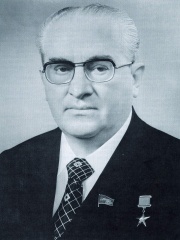
10. Yuri Andropov (1914 - 1984)
With an HPI of 82.33, Yuri Andropov is the 10th most famous Russian Politician. His biography has been translated into 99 different languages.
Yuri Vladimirovich Andropov (15 June [O.S. 2 June] 1914 – 9 February 1984) was a Soviet politician who served as the General Secretary of the Communist Party of the Soviet Union from late 1982 until his death in 1984. He previously served as the Chairman of the KGB from 1967 until 1982. Earlier in his career, Andropov served as the Soviet ambassador to Hungary from 1954 to 1957. During this period, he took part in the suppression of the 1956 Hungarian Uprising. Later under the leadership of Leonid Brezhnev, he was appointed chairman of the KGB on 10 May 1967. As Brezhnev's health deteriorated from the mid-1970s onward, Andropov began to increasingly dictate Soviet policy alongside Foreign Minister Andrei Gromyko and Defense Minister Dmitry Ustinov. Upon Brezhnev's death on 10 November 1982, Andropov succeeded him as General Secretary and, by extension, as the leader of the Soviet Union. Subsequently, he sought to implement reforms to eliminate corruption and economic inefficiency in the country by criminalizing truancy in the workplace and investigating longtime officials for violations of party discipline. Under Andropov's leadership, the Cold War intensified while the regime struggled to handle the growing crisis in the Soviet economy. His major long‑term impact was bringing to the fore a new generation of young reformers as energetic as himself, including Yegor Ligachyov, Nikolai Ryzhkov, and, most importantly, Mikhail Gorbachev. Upon suffering kidney failure in February 1983, Andropov's health began to deteriorate rapidly. He died aged 69 on 9 February 1984, having led the country for about 15 months.
People
Pantheon has 581 people classified as Russian politicians born between 95 BC and 2001. Of these 581, 188 (32.36%) of them are still alive today. The most famous living Russian politicians include Vladimir Putin, Dmitry Medvedev, and Sergey Lavrov. The most famous deceased Russian politicians include Vladimir Lenin, Nicholas II of Russia, and Mikhail Gorbachev. As of April 2024, 43 new Russian politicians have been added to Pantheon including Roman Starovoyt, Tatyana Yumasheva, and Yevgeny Zinichev.
Living Russian Politicians
Go to all RankingsVladimir Putin
1952 - Present
HPI: 90.03
Dmitry Medvedev
1965 - Present
HPI: 76.96
Sergey Lavrov
1950 - Present
HPI: 76.47
Lyudmila Putina
1958 - Present
HPI: 72.74
Viktor Zubkov
1941 - Present
HPI: 70.40
Gennady Zyuganov
1944 - Present
HPI: 70.29
Mykola Azarov
1947 - Present
HPI: 70.26
Sergey Shoygu
1955 - Present
HPI: 69.94
Igor Smirnov
1941 - Present
HPI: 69.09
Mikhail Mishustin
1966 - Present
HPI: 68.81
Nikolai Patrushev
1951 - Present
HPI: 67.60
Ramzan Kadyrov
1976 - Present
HPI: 67.31
Deceased Russian Politicians
Go to all RankingsVladimir Lenin
1870 - 1924
HPI: 91.51
Nicholas II of Russia
1868 - 1918
HPI: 87.96
Mikhail Gorbachev
1931 - 2022
HPI: 87.63
Kim Jong-il
1941 - 2011
HPI: 87.59
Peter the Great
1672 - 1725
HPI: 86.89
Nikita Khrushchev
1894 - 1971
HPI: 85.59
Ivan the Terrible
1530 - 1584
HPI: 84.95
Boris Yeltsin
1931 - 2007
HPI: 84.88
Yuri Andropov
1914 - 1984
HPI: 82.33
Alexander II of Russia
1818 - 1881
HPI: 82.13
Alexander III of Russia
1845 - 1894
HPI: 81.27
Konstantin Chernenko
1911 - 1985
HPI: 81.23
Newly Added Russian Politicians (2025)
Go to all RankingsRoman Starovoyt
1972 - 2025
HPI: 55.59
Tatyana Yumasheva
1960 - Present
HPI: 53.41
Yevgeny Zinichev
1966 - 2021
HPI: 48.32
Aleksei Chaly
1961 - Present
HPI: 47.16
Vladimir Ryzhkov
1966 - Present
HPI: 46.51
Dmitry Patrushev
1977 - Present
HPI: 45.67
Olga Vasilyeva
1960 - Present
HPI: 44.63
Vitaly Milonov
1974 - Present
HPI: 43.69
Sardana Avksentyeva
1970 - Present
HPI: 42.85
Dmytro Tymchuk
1972 - 2019
HPI: 42.80
Maxim Katz
1984 - Present
HPI: 42.58
Yoel Razvozov
1980 - Present
HPI: 41.34
Overlapping Lives
Which Politicians were alive at the same time? This visualization shows the lifespans of the 25 most globally memorable Politicians since 1700.

